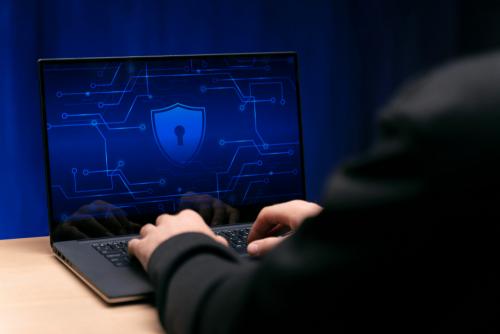From Student to Cyber Security Expert: The Path with an Online M.S. Degree

The digital world is more than just cat videos and social media – it's a battleground where shadowy figures wage war against our data, privacy, and very way of life. The operations of every organization depend on cyber security. With the advancement of technology, there has been a significant increase in demand for cybersecurity specialists.
The world of cybersecurity is large and dynamic, requiring a cast of heroes with a variety of talents. Your training ground can be an online Master of Science in Cybersecurity program, which will help you advance from a student to a fully qualified cyberdefender prepared to take on the constantly changing challenges in the digital world.
Why Online Cybersecurity Master's Degree?
Flexibility:
You may study at your speed and on your schedule thanks to distance learning programs. If you have other obligations or a full-time job, this may be extremely useful. The tuition for many distance learning programs is reasonable.
Access to high-quality education:
Many respectable universities and institutions offer distance learning programs. This implies that you can earn a top-notch education without moving.
Opportunities for networking:
Many online learning courses include chances to connect with other students and experts in the subject of cybersecurity. You might use this to expand your professional network and get employment after graduation.
Career Possibilities in Cyber Security:
There are many different cybersecurity careers available, but most of them are different. Many career choices in the field of cybersecurity demand a graduate-level skill set in cybersecurity. Some of the top positions in cyber security are listed here.
Chief Information Security Officer:
A senior specialist who protects an organization's data is known as the Chief Information Security Officer or CISO. This means keeping stakeholders informed about information security issues, interacting with them, and creating and sustaining information security and risk management procedures.
Cybersecurity Analyst:
Identification, analysis, and response to cyber threats are the responsibilities of cybersecurity analysts. They strive to defend businesses from cyberattacks and data breaches.
Engineer in security:
To defend enterprises against cyberattacks, engineers in security design and deploy security solutions. They collaborate with intrusion detection systems, firewalls, and other security tools.
Penetration Examiner:
A penetration tester finds gaps and flaws in systems that hackers can take advantage of. Another name for them is ethical hackers. To test the network, an online service, or a product, they have a variety of tools. In addition, they design and construct new penetration instruments and record the study and results for future use.
Emerging developments in cybersecurity:
Cloud Security:
While cloud computing is gaining popularity, it also brings with it new security vulnerabilities. Cloud security experts in the field of cybersecurity are in high demand.
Artificial intelligence (AI):
AI is used to create novel, highly effective cyberattacks. Cybersecurity experts must be able to comprehend and counteract these attacks.
Internet of Things (IoT):
As more and more devices are connected to the internet, the attack surface also grows. IoT devices need to be protected from cyberattacks by cybersecurity experts.
Strategies for a career in cybersecurity:
Keep up with the most recent trends and threats:
Because the cybersecurity landscape is continuously changing, it's crucial to keep up with the most recent trends and threats. You can achieve this by reading blogs and articles about cybersecurity, going to conferences, and enrolling in online courses.
Obtain a certification:
There are a variety of cybersecurity credentials available. Obtaining certification might help you show prospective employers your abilities and knowledge.
Create a robust network:
Networking is crucial in any industry, but it's crucial in cybersecurity. Attend industry events and get to meet other cybersecurity experts. This will enable you to keep current and hear about new employment opportunities.
The Arsenal of a Cyber Defender: What You'll Wield
The curriculum of an online M.S. in Cybersecurity is your digital arsenal, packed with cutting-edge tools and knowledge:
- Cryptography
- Network Security
- Operating System Security
- Incident Response
- Digital Forensics
- Risk Management
These are just the basics, of course. Many programs offer specializations, letting you tailor your skills to specific areas like cloud security, mobile defense, or critical infrastructure protection.
Conclusion:
Your ability to excel in this fascinating and quickly expanding area can be enhanced by earning a master's degree in cybersecurity. You can pursue careers as a security engineer, analyst, or even team leader in cybersecurity with a master's degree.
A distance learning program is a fantastic choice if you're searching for a flexible and practical way to complete your master of science in cyber security. Through distance learning programs, you can study when and how you want. If you are a full-time employee or have other obligations, this may be extremely helpful to you. Furthermore, many distance learning programs have reasonable tuition costs.
No matter how you choose to earn your online Cybersecurity Master's Degree, you can be confident that you are making a wise investment in your future.
Post Your Ad Here



Comments